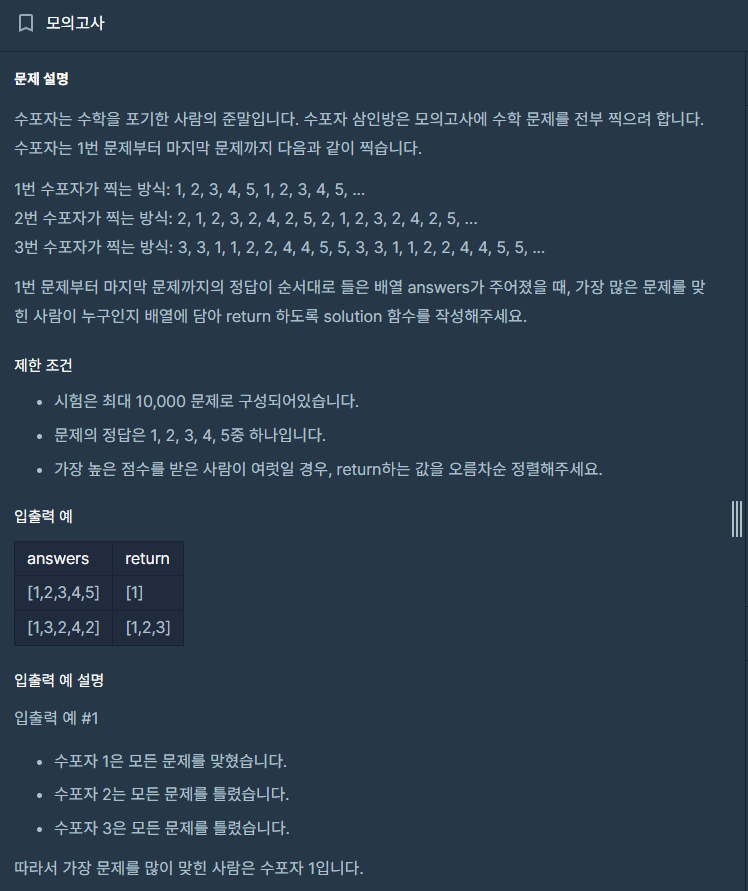반응형
문제 설명
수포자는 수학을 포기한 사람의 준말입니다. 수포자 삼인방은 모의고사에 수학 문제를 전부 찍으려 합니다. 수포자는 1번 문제부터 마지막 문제까지 다음과 같이 찍습니다.
1번 수포자가 찍는 방식: 1, 2, 3, 4, 5, 1, 2, 3, 4, 5, ...
2번 수포자가 찍는 방식: 2, 1, 2, 3, 2, 4, 2, 5, 2, 1, 2, 3, 2, 4, 2, 5, ...
3번 수포자가 찍는 방식: 3, 3, 1, 1, 2, 2, 4, 4, 5, 5, 3, 3, 1, 1, 2, 2, 4, 4, 5, 5, ...
1번 문제부터 마지막 문제까지의 정답이 순서대로 들은 배열 answers가 주어졌을 때, 가장 많은 문제를 맞힌 사람이 누구인지 배열에 담아 return 하도록 solution 함수를 작성해주세요.
제한 사항
- 시험은 최대 10,000 문제로 구성되어있습니다.
- 문제의 정답은 1, 2, 3, 4, 5중 하나입니다.
- 가장 높은 점수를 받은 사람이 여럿일 경우, return하는 값을 오름차순 정렬해주세요.
프로그래머스
코드 중심의 개발자 채용. 스택 기반의 포지션 매칭. 프로그래머스의 개발자 맞춤형 프로필을 등록하고, 나와 기술 궁합이 잘 맞는 기업들을 매칭 받으세요.
programmers.co.kr

1차 풀이 코드
using System;
using System.Collections.Generic;
using System.Linq;
public class Solution {
public int[] solution(int[] answers) {
Queue<int> list1 = new Queue<int>();
list1.Enqueue(1);
list1.Enqueue(2);
list1.Enqueue(3);
list1.Enqueue(4);
list1.Enqueue(5);
Queue<int> list2 = new Queue<int>();
list2.Enqueue(2);
list2.Enqueue(1);
list2.Enqueue(2);
list2.Enqueue(3);
list2.Enqueue(2);
list2.Enqueue(4);
list2.Enqueue(2);
list2.Enqueue(5);
Queue<int> list3 = new Queue<int>();
list3.Enqueue(3);
list3.Enqueue(3);
list3.Enqueue(1);
list3.Enqueue(1);
list3.Enqueue(2);
list3.Enqueue(2);
list3.Enqueue(4);
list3.Enqueue(4);
list3.Enqueue(5);
list3.Enqueue(5);
Dictionary<int, int> dic = new Dictionary<int, int>();
dic.Add(1, 0);
dic.Add(2, 0);
dic.Add(3, 0);
for (int i = 0; i < answers.Length; i++)
{
var item = list1.Dequeue();
if (answers[i] == item)
{
dic[1]++;
}
list1.Enqueue(item);
}
for (int i = 0; i < answers.Length; i++)
{
var item = list2.Dequeue();
if (answers[i] == item)
{
dic[2]++;
}
list2.Enqueue(item);
}
for (int i = 0; i < answers.Length; i++)
{
var item = list3.Dequeue();
if (answers[i] == item)
{
dic[3]++;
}
list3.Enqueue(item);
}
var maxValue = dic.Max(x => x.Value);
var list = new List<int>();
foreach(var i in dic)
{
if (i.Value == maxValue)
{
list.Add(i.Key);
}
}
return list.ToArray();
}
}
2차 풀이 코드
using System;
using System.Collections.Generic;
using System.Linq;
public class Solution {
public int[] solution(int[] answers) {
int[] list1 = new int[] { 1, 2, 3, 4, 5 };
int[] list2 = new int[] { 2, 1, 2, 3, 2, 4, 2, 5 };
int[] list3 = new int[] { 3, 3, 1, 1, 2, 2, 4, 4, 5, 5 };
Dictionary<int, int> dic = new Dictionary<int, int>();
dic.Add(1, 0);
dic.Add(2, 0);
dic.Add(3, 0);
for (int i = 0; i < answers.Length; i++)
{
if (answers[i] == list1[i % list1.Length])
{
dic[1]++;
}
}
for (int i = 0; i < answers.Length; i++)
{
if (answers[i] == list2[i % list2.Length])
{
dic[2]++;
}
}
for (int i = 0; i < answers.Length; i++)
{
if (answers[i] == list3[i % list3.Length])
{
dic[3]++;
}
}
var maxValue = dic.Max(x => x.Value);
var list = new List<int>();
foreach(var i in dic)
{
if (i.Value == maxValue)
{
list.Add(i.Key);
}
}
return list.ToArray();
}
}
queue로 작성했던 부분을 나머지 연산으로 대체하였다. 성능은 별반 차이없지만 가독성이 올라갔다.
'프로그래밍 > Algorithm' 카테고리의 다른 글
| [프로그래머스 Programmers] 약수의 개수와 덧셈 (1) | 2024.01.09 |
|---|---|
| [프로그래머스 Programmers] 콜라츠 수열 만들기 (0) | 2024.01.03 |
| 지구 종말에 대한 하노이 예언 (0) | 2023.12.12 |
| [프로그래머스 Programmers] 정수를 나선형으로 배치하기 (1) | 2023.12.11 |
| [프로그래머스 Programmers] 수 조작하기 (2) | 2023.12.05 |




댓글